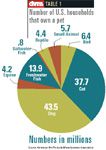R.I. Enacts first statewide mandate to sterilize cats
Providence, R.I. - Rhode Island hinges on becoming the nation's first state to mandate the sterilization of cats.
PROVIDENCE, R.I. — Rhode Island hinges on becoming the nation's first state to mandate the sterilization of cats.

Gov. Don Carcieri's signature was needed at presstime to cement legislation forcing cat owners to spay and neuter their pets. Language in the act, passed by the General Assembly last month, requires cats 6 months or older to be sterilized unless owners purchase $100 breeders' licenses or a permit. Violators face $75 monthly fines.
It's a comprehensive measure to curb the state's stray cat population, proponents say, noting more than 2,100 unwanted felines were euthanized in Rhode Island last year. While the Rhode Island Veterinary Medical Association (RIVMA) took a neutral stance on the bill, group leaders are "supportive of any program that will help get people to spay and neuter their pets," President Dr. Courtney Rebensdorf says. As a profession, veterinarians were detached from any enforcement or reporting responsibilities, an initial source of concern for RIVMA members, she adds.
"Population control is a huge problem here; I'm called on a weekly basis to go up to our municipal shelter to euthanize cats," Rebensdorf says. "We didn't want veterinarians to have any role in enforcing it because it might decrease people's willingness to bring ill pets."
Enforcement concerns
Yet with no agency assigned to enforcement in the bill, the mandate is ineffective, critics say. At the same time, owners' seeking to avoid being fined might put more cats in shelters and on the streets, welfare advocates contend.
Low-cost spay/neuter clinics might answer the income-assistance need, but government funding for such efforts have floundered, state officials say. The setting also isn't ideal for quality medical examinations, veterinarians add.

Table 1. Number of U.S. households that own a pet
To provide medical care for pets of low-income owners, state veterinary leaders created the RIVMA Companion Animal Foundation in 2004. This year, private donations totaled $40,000 and some of that money likely will be provided to spay and neuter cats, says Dr. Cathy Lund, RIVMA past president.
Funded via private donations, the money is funneled through veterinarians for clients they recommend. While the foundation's primary goal is to provide veterinary medical care to pets of low-income owners, sterilization falls into that category. More than $40,000 is available for grants this year.
That doesn't mean the state's 300-plus practitioners will receive a windfall of sterilization candidates. "Most of the owners a veterinarian sees would already spay and neuter their pet," Lund says.
Newsletter
From exam room tips to practice management insights, get trusted veterinary news delivered straight to your inbox—subscribe to dvm360.